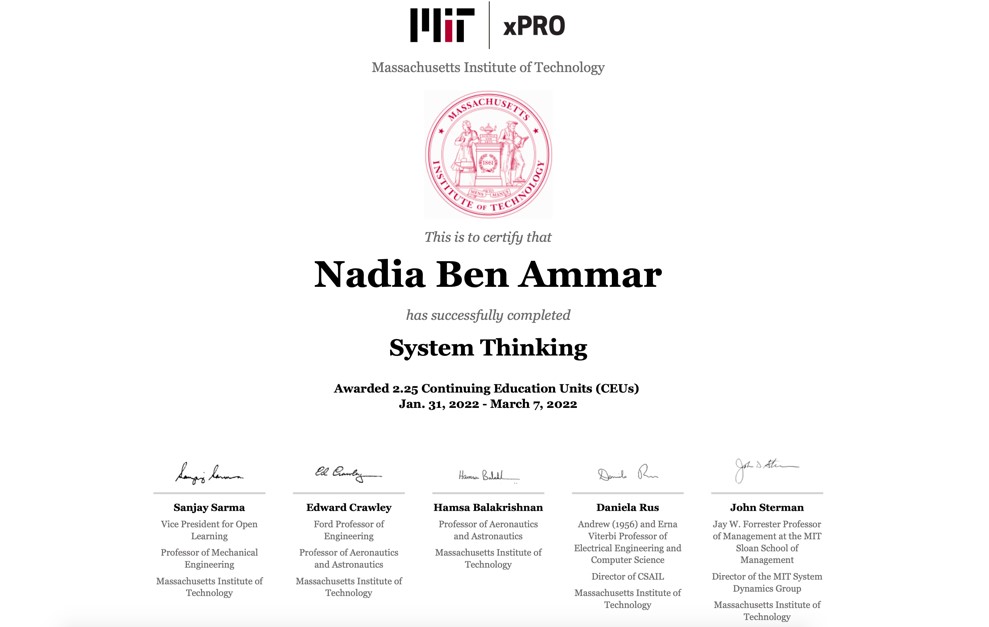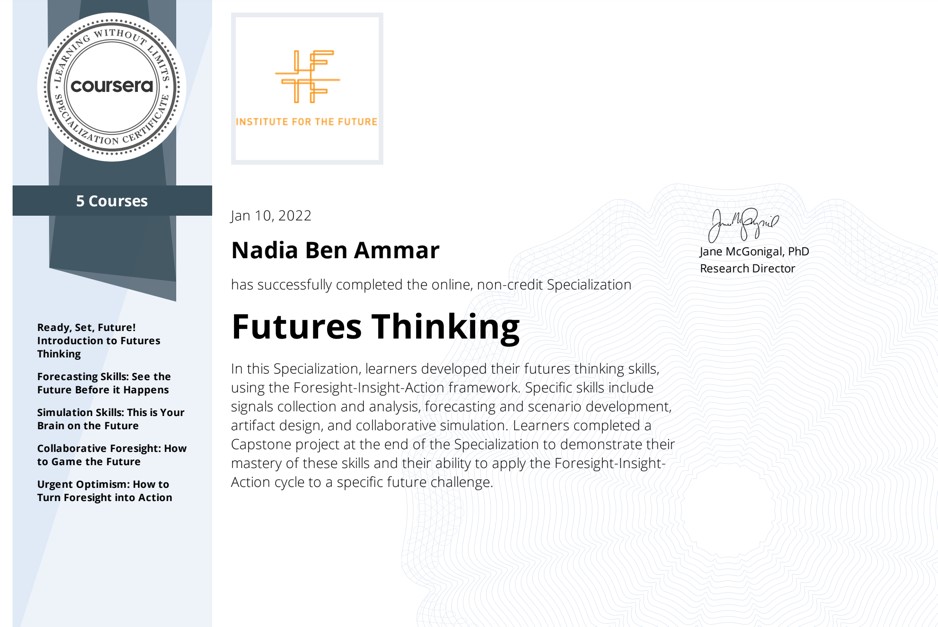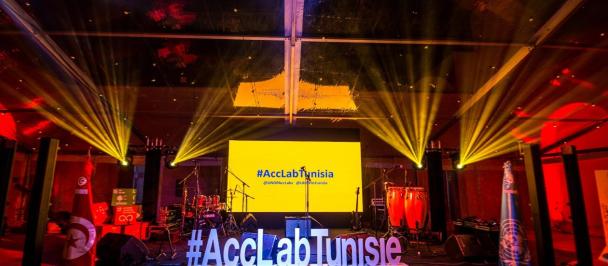Written by : Nadia Ben Ammar
Why you should never throw away your learning objectives
10 mars 2022
I have recently managed to achieve what I consider to be a very successful endeavor: reaching my learning goals, that is, the goals I have set out at the beginning of the year in terms of trainings.
In fact, I even got a scholarship which was offered to me for committing to one of the online specializations I have completed (bonus!). Instead of simply posting proudly my certificates (and I am proud, believe me!), I wanted to share this experience with others in the hope to inspire them to give more importance and not neglect their learning objectives. How do I know they do? I know because I often do and did the same, which is why I am particularly happy with my learning achievements.
I also know, because as part of the learning committee in my organization, I know for a fact that many people a) are not always aware and informed about available learning opportunities offered by their organization, b) don’t sign up for learning activities despite available budget allocated to it and, c) often do not complete courses they have signed up for. In fact, my learning activities were not always prioritized in the past nor did they always end up with happy endings.
Finishing online, paid or unpaid courses, committing to trainings and learning activities is often a tough task, not only because we do not find the time to finish but also because when we do, we are not always in the appropriate mood to learn or even have the energy for it. I wanted to share my last learning journey to demonstrate why we should exercise our learning muscle more often and how this can benefit not only your career but also enrich your work experience.
Throughout the journey, I also share a few elements which can help you, in my humble opinion, find the appropriate course, and one you’ll be more motivated to finish, hopefully.
Why learn through taught courses?
Let me first tell you that I don’t believe that trainings and courses are the main source of learning in our lives. Even the hands-on trainings offer a minimal amount of practice and to me practice and experience which we go through in our professional and personal lives is a greater source of learning than any online or face-to-face course. However, trainings and courses enable us to formalize much of the knowledge we acquire from practice and enrich it through existing theoretical frameworks and functional models.
The latter can help us think about our work methods in more abstract terms and adopt a more meta perspective on our practices. Courses which are technical and non-technical can also provide alternative methodologies used in our line of work or new knowledge unveiled through more recent research.
I am a head of exploration at the Accelerator lab in UNDP Tunisia, and thus often on the lookout for new methodologies to approach and understand complex systems, in a collective way. The MIT xpro System Thinking course has helped me to discover how various system thinking tools and approaches (computational approach, for instance) can be applied to understand complex systems around us.
While I could have accessed the tools and experimented with them prior to taking the course, it was very useful to learn specific system thinking jargon in order to describe systems at various levels to collaborators and co-workers in order to create shared meanings. It was also great to practice using those tools in a more supervised and assessed environment with feedback from professionals.
How can course material empower your work?
At the lab we often share, design or adapt existing foresight tools (for instance) to better anticipate the future. I have practiced and experimented using such tools to understand many complex challenges in Tunisia including waste management and trust. I did this without much formal knowledge on futures thinking approaches and methodologies, tweaking some existing open tools databases or ones I could get from my colleagues.
I learned a lot from this practice. I discovered what learning outputs can be achieved through using these various tools in exploration and I wanted to learn more and understand the theoretical forces behind those tools and methodologies in order to maximize their usefulness and effectiveness in generating new learnings. Many courses were offered online in this area, and I went for one offered on classera, as I was already familiar with the platform.
This is how I completed the 5 month futures specialization. What did this journey provide? For one, I got access to many more tools and the opportunity to play with those and learn how to use them. It also helped me uncover many approaches, the principles they were built on and opened a door full of possibilities as I could see various examples from practitioners as to how these tools were used and what results they could generate. Of particular interest was the collaborative foresight course and the urgent optimism which both provided a bridge between imagining the future and translating it into collective actions.
This is why it is important that you choose ones where you already have the opportunity to practice your knowledge, and which can unlock new possibilities and ways of doing your work.
Course choice
This part is very crucial. I, signed up for courses and learning programs in the past which I could not see the point of finishing or where my subconscious could not be bothered with creating any cognitive energy (or physical) to keep going. We need to ask ourselves why this is the case. I believe that the choice of the course is very important in keeping you focused and committed. Courses where knowledge or skills acquired can be directly applied to your work to improve your results should be your number one choice. This is why I believe I pushed myself to finish the courses I signed up for in the past year. Courses which, if completed, can open new career perspectives or facilitate advances in your career can also provide a powerful incentive so make sure that the courses you choose are aligned with where you want to go and what you want to do in the next stages of your career.
What theme should I go for?
You need to ask yourself, first, what is it that will help you be better at your job, assess your current capacities (skills) and knowledge (content)and identify the ones which will help you be better at what you do, if you’re looking for courses which teach specific skills. Make sure you can practice those skills right after completing the course and make sure that knowledge acquired is useful in your line of work. You can usually do this intuitively or take time to self-reflect on the matter.
What modality should I go for?
Courses come in all shapes and sizes. You get online courses, face-to-face ones (although this was problematic during COVID-19 times), self-paced, peer-assessed, time-bound, paid and free ones. This really depends on your lifestyle. In general, I would advise you to go for a course which you have the ability to complete, as a first criterion. If you know you can’t make it to face-to-face training sessions, choose online ones, if you know your schedule is usually busy, take self-paced flexible courses. I find that paid courses (even the cheap ones) provide an extra-motivation because they create and accountability paradigm for learning. If you have allocated learning budget or have the personal means to pay for a course, go for it.
Although ideally, we should be pushed only by the intrinsic desire to learn, the extra pressure is usually good to push you until you build that learning self-discipline you need. I also, find that, when possible, face-to-face courses can be more engaging and motivate individuals through interactions with other learners and teaching/training staff. Frankly, though, if the online learning experience is well designed, you can be every bit as engaged. If you go for online, courses, read the reviews by people who participated in other cohorts to understand the learning experience. Is the platform user-friendly? It it interactive? engaging? Very prestigious institutions can sometimes provide the worst learning platforms which in term, give rise to terrible learning experiences, this means frustration and often, not completing your course.
Learning is a habit, acquire it.
If we don’t learn, eventually our approach gets gradually obsolete and so becomes our knowledge. It is important to take time even daily to look at new approaches and knowledge in our domain of expertise. My former supervisor, Julien Hautier, used to ask us to allocate 1 hour daily for learning (from 9 to 10 am, beginning of the working day). This was a time when we would look at ted talks, academic articles, press articles, news or social media posts and blogs which would help us enrich our practice and the way we implement our projects.
It is a simple step, but through committing a specific time which is almost sacred for learning, you start building that curiosity, this eagerness for new knowledge and skills. “L’appétit vient en mangeant”, say the French, so don’t set out large objectives and start with small commitments, they will build your appetite for more learning “food”. When it comes to courses, you can do the same. Allocate and plan time (specific calendar dates) for learning and stick to those. If your organization offers learning leave days, take them (to learn!). Don’t forget to get in touch with your learning focal points in your organization and ask them about any learning opportunities or budget allocated to learning you might be entitled for.
In order to make the best of our learning activities, we need to truly want to learn what we learn and see the use of the learning outcomes in our professional or personal lives and we also need a certain level of cognitive energy to do so. Choosing courses which we can directly apply to our work is key while modalities have to really fit our personal habits. But while our work objectives often come first, we need to sometimes force ourselves to commit to learning goals in order to keep the habit of learning and formalizing knowledge. Our KPIs at work have a strong weight on our evaluation but what if those lightweight learning objectives can get you to achieve those technical KPIs faster?

 Locations
Locations





